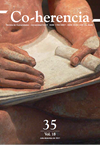El episodio de las Sirenas en Argonáuticas de Apolonio de Rodas: enriquecimiento cómico y aspectos metapoéticos
Main Article Content
Keywords
Argonáuticas, comedia, épica, Odisea, sirenas, literatura griega
Resumen
Así como en la Odisea el héroe en su viaje de regreso debe resistir al encanto de las Sirenas, en las Argonáuticas los héroes también deben superarlas en su regreso a la Hélade. Aunque los estudios bibliográficos advierten un cambio de tono entre el modelo homérico y el texto apoloniano (de siniestro a humorístico y erótico), consideramos que no han advertido su importante valor metapoético. Según nuestra lectura, el enfrentamiento entre Orfeo y las Sirenas por medio del canto representa la relación del nuevo poema con la tradición y retoma significados y funciones del episodio odiseico, donde se plantea una clara disputa entre Odisea e Ilíada, como lo demuestra el clásico artículo de Pucci (1979). En este sentido, es importante destacar no solo el tono, sino también la presencia de una dicción cómica en el episodio apoloniano, que representa el carácter no-épico de las Sirenas derrotadas por Orfeo.
Descargas
Referencias
Asper, M. (2008). Apollonius on Poetry. En T. Papanghelis & A. Rengakos (Eds.), Brill’s Companion to Apollonius Rhodius (pp. 167-198). Brill.
Brioso Sánchez, M. (2013). Las sirenas en la épica griega: de Homero a las Argonáuticas órficas (II). Habis, (44), 43-59. https://bit.ly/2XLtdX4
Campbell, M. (1981). Echoes and Imitations of Early Epic in Apollonius Rhodius. Brill (Mnemosyne Suppl. 72).
Campbell, M. (1983). Studies in the Third Book of Apollonius Rhodius’ Argonautica. Olms.
Christensen, J. (2018). Eris and Epos: Composition, Competition and the ‘Domestication’ of Strife. Yearbook of Ancient Greek Epic Online, 3(1), 1-39. https://doi.org/10.1163/24688487-00201001
Cuypers, M. P. (2004). Apollonius of Rhodes. En I. J. F. de Jong, R. Nünlist & A. Bowie (Eds.), Narrators, Narratees, and Narratives in Ancient Greek Literature (pp. 43-62). Brill.
De Jong, I., & Nünlist, R. (Eds.) (2007). Time in Ancient Greek Literature. Brill.
Dougherty, C. (2001). The Raft of Odysseus: The Ethnographic Imagination of Homer’s Odyssey. Oxford University Press.
Fantuzzi, M., & Hunter, R. (2007). Tradition and Innovation in Hellenistic Poetry. Cambridge.
Farrell, J. (2003). Classical Genre in Theory and Practice. New Literary History, 34(3), 383-408. https://www.jstor.org/stable/20057790
Fränkel, H. (1961). Apollonii Rhodii Argonautica. Oxford University Press.
Fusillo, M. (1985). Il Tempo delle Argonautiche: Un’analisi del racconto in Apollonio Rodio. Ateneo.
García Gual, C. (2014). Sirenas: Seducciones y metamorfosis. Turner.
Gresseth, G. K. (1970). The Homeric Sirens. Transactions and Proceedings of the American Philological Association, 101, 203-218. https://doi.org/10.2307/2936048
Harrison, S. J. (2007). Generic Enrichment in Vergil and Horace. Oxford University Press.
Harrison, S. J. (2013). Introduction. En T. Papanghelis, S, Harrison & S. Frangoulidis (Eds.), Generic Interfaces in Latin Literature (pp. 1-18). De Gruyter.
Homero (1993). Odisea (J. M. Pabón, Trad.). Gredos.
Hunter, R. (1993). The Argonautica of Apollonius. Cambridge University Press.
Hunter, R. (2008). The Poetics of Narrative in the Argonautica. En T. Papanghelis & A. Rengakos (Eds.), Brill’s Companion to Apollonius
Rhodius (pp. 115-146). Brill.
Kaiser, E. (1964). Odyssee-Szenen als Topoi. Museum Helveticum, 21(4), 109-136. https://www.jstor.org/stable/24813799
Klooster, J. J. (2011). Poetry as Window and Mirror. Brill.
Knight, V. (1995). The Renewal of Epic: Responses to Homer in the “Argonautica” of Apollonius. Brill.
Kyriakou, P. (1994). Empedoclean Echoes in Apollonius Rhodius’ ‘Argonautica’. Hermes, 122(3), 309-319. https://www.jstor.org/stable/4477023
Merkelbach, R. (1969). Untersuchungen zur Odyssee. Beck.
Meuli, K. (1921). Odyssee und Argonautika. Crown octavo. Weidmann.
Mori, A. (2008). The Politics of Apollonius Rhodius’ Argonautica. Cambridge University Press.
Morrison, A. (2007). The Narrator in Archaic Greek and Hellenistic Poetry. Cambridge University Press.
Pucci, P. (1979). The Song of the Sirens. Arethusa, 12(2), 121-132. https://www.jstor.org/stable/26308139
Revermann, M. (2013). Paraepic Comedy: Point(s) and Practices. En E. Bakola, L. Prauscello & M. Telò (Eds.), Comic Interactions: Comedy
and Other Genres (pp. 101-128). Cambridge University Press.
Russell, D. A. (1979). De imitatione. En D. West & T. Woodman (Eds.), Creative Imitation and Latin Literature (pp. 1-16). Cambridge University Press.
Schur, D. (2014). The Silence of Homer’s Sirens. Arethusa, 47(1), 1-17. https://www.jstor.org/stable/26322591
Vian, F. & Délage, E. (1996). Apollonios de Rhodes: Argonautiques Vol. III: Chant IV. Les Belles Lettres.
West, M. L. (2005). Odyssey and Argonautica. Classical Quaterly, 55(1), 39-64. https://www.jstor.org/stable/3556238
Zanker, G. (1987). Realism in Alexandrian Poetry: A Literature and Its Audience. Croom Helm.





